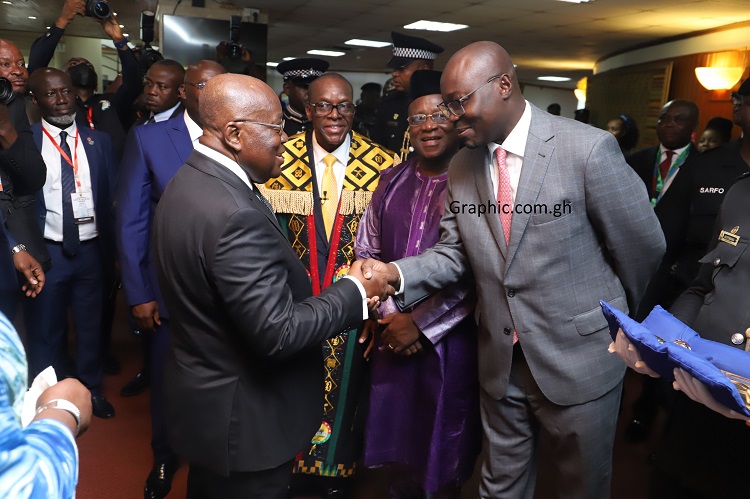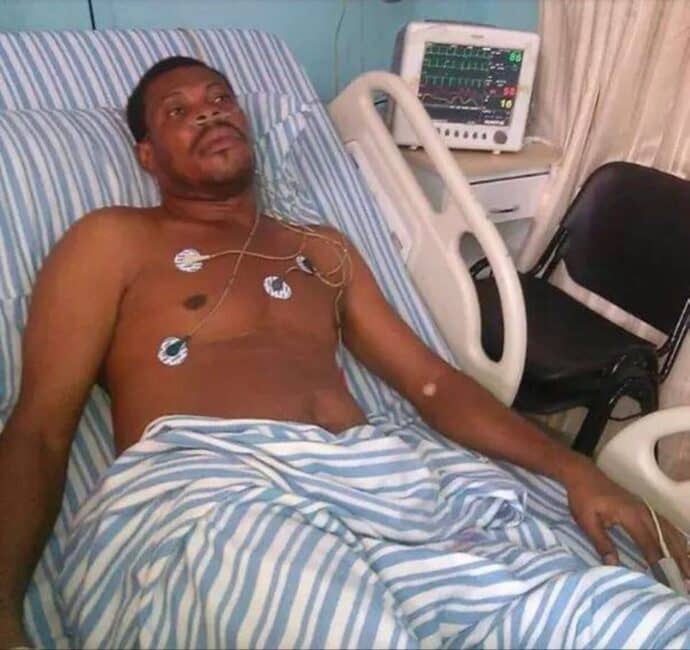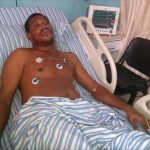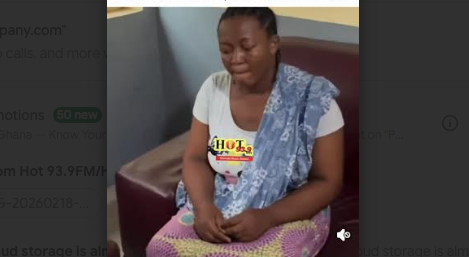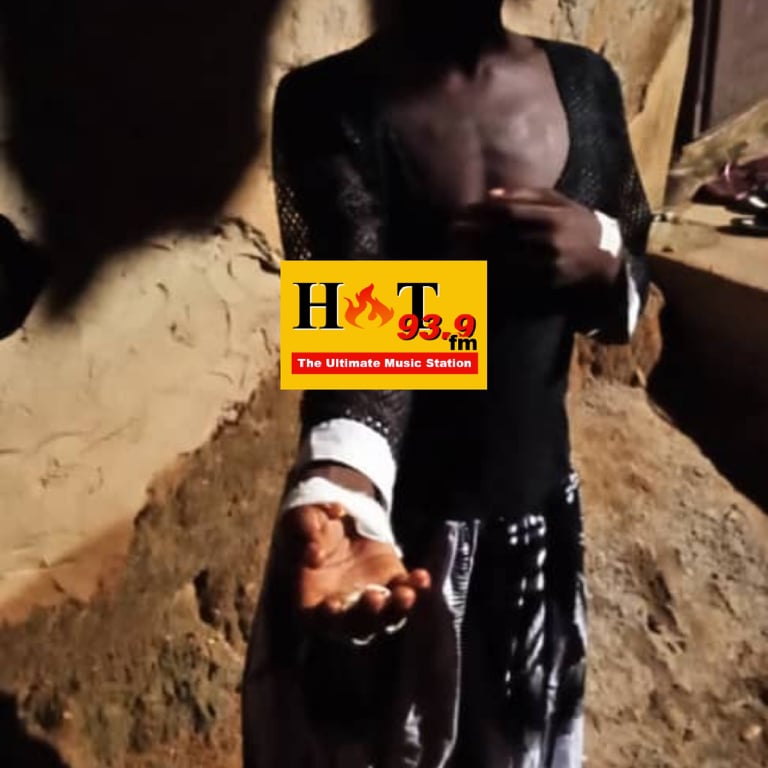President Nana Addo Dankwa Akufo-Addo has rallied Ghanaians to believe in themselves and their capacity to overcome the current economic problems bedevilling the country.
He said when dark clouds created shadows that momentarily shielded yearned-for vision, they should not be moments of despair, adding: “Such moments call for the strength of character, a sense of purpose and an abiding commitment to the general good.”
President Akufo-Addo made the call when he delivered a message on the State of the Nation to Parliament in Accra Wednesday (March 8, 2023).
He described the economic challenges as a phase in the development process, and that he was certain “that this too shall pass. We have done it before and we will do it again”.
Present in Parliament for the address were former Presidents John Agyekum Kufuor and John Dramani Mahama; the Chief Justice, Justice Kwasi Anin Yeboah; justices of the Supreme Court, Service Commanders, the Chairman of the Council of State, Nana Otuo Siriboe II, members of the Diplomatic Corps and other national figures.
President Akufo-Addo, whose address was heavy on the economy, said history was replete with instances when nations, at a point in time, came under difficult situations.
He touched on the gravity of the economic situation and how quickly the economy would be stabilised towards rapid growth.
Tracing the trajectory of the current situation, the President said prior to the outbreak of COVID-19 and the Russia-Ukraine war, all empirical indicators pointed in the direction that the country was doing well.
“I have said, and many others, including the Managing Director of the IMF, have also said, that our economy was doing well until COVID-19 and the war in Ukraine took us off course,” he said.
President Akufo-Addo said the two-pronged crisis resulted in currency buffeting, inflation shot up very high and, for the first time in the life of the country, “debt exchanges have become the language of everyday conversations”.
He recounted various interventions by the government in the health, economic, educational, security and livelihood sectors, which demanded huge resources when the COVID-19 pandemic surfaced.
COVID-19 funds
Responding to claims in recent times by the Minority that the government was reckless with COVID-19 funds, the President noted that the economic fallout from the pandemic was so widespread and long-lasting that it was important to demonstrate that the funds were not misused.
“It is critical that we do not lose the confidence of the people that a crisis that they were led to believe we were all in together was abused for personal gain,” he added.
He gave an assurance that nothing untoward had been done with the funds and that the responses from the ministers of Health and Finance had sufficiently laid to rest queries from the Auditor-general’s report.
He expressed the hope that any objective scrutiny of the statements from the two ministers would justify the conclusion.
Breakdown
President Akufo-Addo gave a breakdown of the usage of the funds to include GH¢518 million of grants and loans to micro, small and medium enterprises through the Ghana Enterprise Agency, through which 302,515 enterprises, out of which 60 per cent were women-owned, benefitted.
He indicated that the enterprises were in distress as a result of the pandemic, adding: “For some traders, the receipt of GH¢1,000 made a difference between the ruin of the household and survival.”
He said 58,041 health workers were employed to supplement the existing health sector workforce, noting that subsequently, all had been absorbed as permanent workers in the health sector.
He added that frontline health workers were also granted a 50 per cent tax relief for the period and wondered if that was something to regret.
Again, the President indicated that all households enjoyed free water supply and huge discounts on electricity bills, while an economic cushion was provided to protect lives and livelihoods at a time of difficulty.
“Today, the government’s support for utility bills is being projected by some as a waste, or to use that word so beloved of some commentators, ‘profligate’,” he said.
On Debt/loans
The President said beyond the use of COVID-19 funds, there were legitimate questions about how the country’s debt situation got where it was.
Providing an explanation, he indicated that the government had not been reckless in borrowing and spending and noted that the debts being serviced were not contracted only during the period of his administration.
He said the government had spent the money on building roads, bridges and schools to train our young people and equip them to face a competitive world.
He explained that looking at the work that needed to be done on roads, bridges, classrooms, furniture and equipment and the number of towns and villages that still did not have access to potable water, “I daresay no one can suggest we have over-borrowed or spent recklessly”.
On Infrastructure
President Akufo-Addo explained that beyond the construction of roads, his administration had implemented the National Identification System, with the Ghana Card being the most sought-after identification system; constructed more railways than any other government in the Fourth Republic and established the Zongo Development Fund.
He also indicated that more than 93 per cent of the fibre optic cables constructed in the country were done in the last five years, with the number of public libraries in the country increasing from 61 from independence until 2017 to 115 in 2022, while more equipment (vehicles, ammunition, etc) had been provided for the security services than any other government in the Fourth Republic.
e-VAT
The President mentioned the introduction of an e-VAT and e-Invoicing system which had culminated in improvement in revenue collection.
He cited the example of 19 taxpaying companies on the e-Vat system increasing their monthly sales from GH¢222 million in November 2021 to GH¢720 million in November 2022.
He said in December 2021, total monthly sales of GH¢284 million also saw a huge increase to GH¢1 billion in December 2022.
IMF
President Akufo-Addo commended Parliament for its support throughout the engagement with the International Monetary Fund (IMF), as well as the passage of key revenue laws.
He indicated that there were a few bills, such as the Income Tax (Amendment) Bill, the Excise Duty & Excise Tax Stamp (Amendment) Bill, as well as the Growth and Sustainability Levy Bill, which were outstanding and needed urgent attention from the House and passage to complete the prior actions.
That, he explained, would put the country in readiness for its presentation to the IMF Board and, more importantly, bolster its domestic revenue mobilisation efforts.
The President said given the extent of the fiscal and debt sustainability issue the government was addressing, fiscal adjustment and structural reforms were not sufficient for the restoration of debt sustainability.

